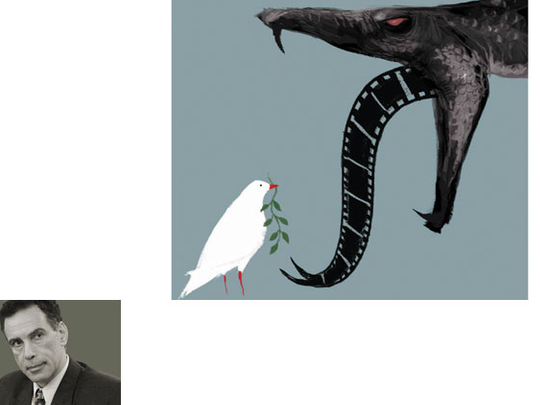
The anti-Islam film, The Innocence of Muslims, provoked a firestorm of protests from Libya, Tunisia and Egypt to Pakistan, Afghanistan and Indonesia. The violence resulted in the deaths of more than 30 people in seven countries, including that of the US Ambassador to Libya.
Many demonstrators denounced the US, burned the American flag, attempted, and some succeeded, in storming American embassies. Some demonstrators demanded that the American government act against the filmmaker, others demanded that US President Barack Obama apologise to the Muslims. Some commentators suggested a strategy of separation whereby the US would simply discontinue its relations with the Muslim world.
The Obama administration took the unusual step of asking Google, which owns YouTube where the film was shown, to stop showing the film. Obama and the US Secretary of State, Hillary Clinton, appeared in paid advertisements on Pakistani Television and strongly condemned the film and its offensive message.
Now, the incompetence of the filmmaker is only matched by the vulgarity of his offensive message. When the film was first leaked on YouTube, it elicited little or no reaction. Only when an Arabic version was widely distributed to Arabic media outlets did the video clip elicit the violent reaction the filmmaker was hoping to achieve.
Consider the character of the individual who apparently made the offensive film: Nakoula Basseley Nakoula. Nakoula is described by the American press as “an extremist Coptic Christian US-Egyptian citizen”.
He refers to himself as “an Arab thinker interested in Islamic affairs”. In fact, he is a convicted drug felon and a scam artist who told reporters that he was in fact an “Israeli Jew,” and that the film had cost about $5,000,000 (Dh18.36 million) and that the money had come from “wealthy Jewish friends”.
The intention to offend was both deliberate and strategic in nature in that it was intended to promote hatred and intolerance for Islam.
Nakoula reportedly sought advice on how to achieve his goal from such deranged haters of Islam as the Florida evangelist, Terry Jones. On March 20, 2011, Jones held a “trial of the Quran” in his church and finding the Quran guilty of “crimes against humanity,” he burned it in the sanctuary of his church.
Still none of this justifies the indiscriminate violence and destruction inflicted upon innocent people. These violent reactions did not undo the offensive message, but served to promote the film, in ways which it could never have achieved on its own.
The fact is that the demonstrators failed to appreciate this reality and played into the hands of the film maker and whatever hate group was behind the deliberate provocation.
But the crisis illustrates, among other things, the complexity of the challenges facing the nascent democracies in the Arab world. Freedom of expression is a principal pillar of democratic governance. It protects the views most people hate.
However, the average person on the Arab street does not have sufficient appreciation for the value the American political culture has come to place on the importance of freedom of expression. The US Supreme Court described this freedom as “the matrix, the indispensable condition of nearly every other form of freedom”.
Freedom of expression in the US is protected by the First Amendment. Speech can be suppressed in the US only if it is intended to, and likely to produce, “imminent lawless action”. If it does not meet that test, it is protected. Even speech that advocates violence and hatred is protected.
This produces some situations which might seem surprising to most people in the Arab world. For example, most people would be bewildered to learn that the request that White House made to Google to remove the offending film from YouTube, was turned down. Freedom of expression and the need to protect it take precedence even over the wish of the president.
Some of the demonstrators in Egypt reportedly were demanding that Obama apologise for the offence the video caused. To this request, New York Times columnist Thomas Friedman answered by telling the protestors to “look in the mirror”. Then he proceeded to cite a compilation, prepared by an Israeli-headed think-tank in Washington, of vile statements attributed to Muslim clergy and others denigrating Jews, Christians and even Shiites.
Friedman makes the point that the problem runs both ways and concedes that the majority of Muslims do not share the offensive statements he had just quoted.
In his list there was no mention of Israel. This may have been an unfortunate oversight because the examples of racist and reductive portrayal of the Arabs come not only from the lunatic fringe, but also from the mainstream establishment.
Two examples will suffice. In 2004, then deputy defence minister, Ze’ev Boim, asked: “What is it about Islam as a whole and the Palestinians in particular? Is it some form of cultural deprivation? Is it some genetic defect?”
Professor Daniel Bar-Tal of Tel Aviv University conducted a study on the ‘The Arab Image in Hebrew School Textbooks’. His conclusion was that the two main traits of Arabs in the textbooks were “primitiveness and inferiority in comparison to Jews” and other characteristics included “brutality ... cruelty ... treacherousness and aggressiveness”.
Such examples of racism serve to justify the violence inherent in the Zionist approach of displacement, dispossession and occupation of Palestine.
In the end, violent protests do not undo the offence and only reinforce the negative portrayal of the culture that the offence was meant to denigrate in the first place.
Learning the value of peaceful protest strengthens democratic governance. Learning to hear the views we hate diffuses the tension of confrontation that the offensive views were intended to provoke in the first place.
Burning the Quran or offending Prophet Mohammad (PBUH) says more about the perpetrators as prisoners of walls of hatred than it says about Islam. The anti-Islam warriors should be allowed the freedom to hate. This is a more powerful and dignified response than violence, to their deranged view of humanity.
The universal character of Islam and its essential message of peace are too great a timeless attribute of faith to be insulted by fools or defended by violence.
Adel Safty is distinguished visiting professor and special advisor to the rector at the Siberian Academy of Public Administration, Russia. His book, Might Over Right, is endorsed by Noam Chomsky and published in England by Garnet, 2009.










